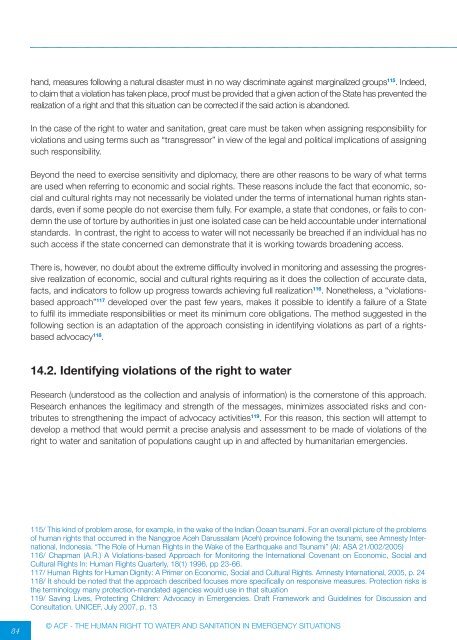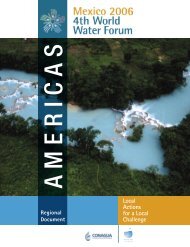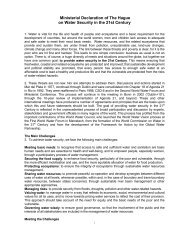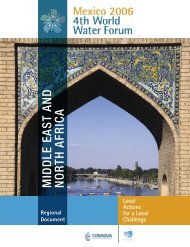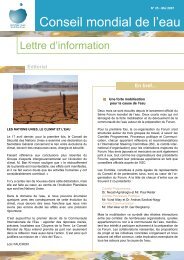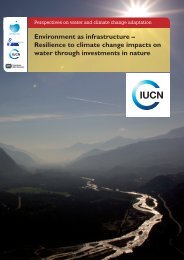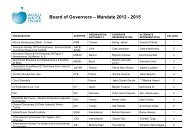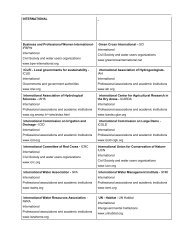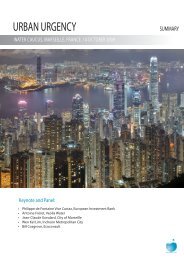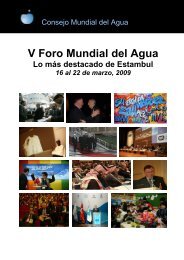the human right to water and sanitation in emergency situations
the human right to water and sanitation in emergency situations
the human right to water and sanitation in emergency situations
Create successful ePaper yourself
Turn your PDF publications into a flip-book with our unique Google optimized e-Paper software.
84<br />
h<strong>and</strong>, measures follow<strong>in</strong>g a natural disaster must <strong>in</strong> no way discrim<strong>in</strong>ate aga<strong>in</strong>st marg<strong>in</strong>alized groups 115 . Indeed,<br />
<strong>to</strong> claim that a violation has taken place, proof must be provided that a given action of <strong>the</strong> State has prevented <strong>the</strong><br />
realization of a <strong>right</strong> <strong>and</strong> that this situation can be corrected if <strong>the</strong> said action is ab<strong>and</strong>oned.<br />
In <strong>the</strong> case of <strong>the</strong> <strong>right</strong> <strong>to</strong> <strong>water</strong> <strong>and</strong> <strong>sanitation</strong>, great care must be taken when assign<strong>in</strong>g responsibility for<br />
violations <strong>and</strong> us<strong>in</strong>g terms such as “transgressor” <strong>in</strong> view of <strong>the</strong> legal <strong>and</strong> political implications of assign<strong>in</strong>g<br />
such responsibility.<br />
Beyond <strong>the</strong> need <strong>to</strong> exercise sensitivity <strong>and</strong> diplomacy, <strong>the</strong>re are o<strong>the</strong>r reasons <strong>to</strong> be wary of what terms<br />
are used when referr<strong>in</strong>g <strong>to</strong> economic <strong>and</strong> social <strong>right</strong>s. These reasons <strong>in</strong>clude <strong>the</strong> fact that economic, social<br />
<strong>and</strong> cultural <strong>right</strong>s may not necessarily be violated under <strong>the</strong> terms of <strong>in</strong>ternational <strong>human</strong> <strong>right</strong>s st<strong>and</strong>ards,<br />
even if some people do not exercise <strong>the</strong>m fully. For example, a state that condones, or fails <strong>to</strong> condemn<br />
<strong>the</strong> use of <strong>to</strong>rture by authorities <strong>in</strong> just one isolated case can be held accountable under <strong>in</strong>ternational<br />
st<strong>and</strong>ards. In contrast, <strong>the</strong> <strong>right</strong> <strong>to</strong> access <strong>to</strong> <strong>water</strong> will not necessarily be breached if an <strong>in</strong>dividual has no<br />
such access if <strong>the</strong> state concerned can demonstrate that it is work<strong>in</strong>g <strong>to</strong>wards broaden<strong>in</strong>g access.<br />
There is, however, no doubt about <strong>the</strong> extreme difficulty <strong>in</strong>volved <strong>in</strong> moni<strong>to</strong>r<strong>in</strong>g <strong>and</strong> assess<strong>in</strong>g <strong>the</strong> progressive<br />
realization of economic, social <strong>and</strong> cultural <strong>right</strong>s requir<strong>in</strong>g as it does <strong>the</strong> collection of accurate data,<br />
facts, <strong>and</strong> <strong>in</strong>dica<strong>to</strong>rs <strong>to</strong> follow up progress <strong>to</strong>wards achiev<strong>in</strong>g full realization 116 . None<strong>the</strong>less, a “violationsbased<br />
approach” 117 developed over <strong>the</strong> past few years, makes it possible <strong>to</strong> identify a failure of a State<br />
<strong>to</strong> fulfil its immediate responsibilities or meet its m<strong>in</strong>imum core obligations. The method suggested <strong>in</strong> <strong>the</strong><br />
follow<strong>in</strong>g section is an adaptation of <strong>the</strong> approach consist<strong>in</strong>g <strong>in</strong> identify<strong>in</strong>g violations as part of a <strong>right</strong>sbased<br />
advocacy 118 .<br />
14.2. Identify<strong>in</strong>g violations of <strong>the</strong> <strong>right</strong> <strong>to</strong> <strong>water</strong><br />
Research (unders<strong>to</strong>od as <strong>the</strong> collection <strong>and</strong> analysis of <strong>in</strong>formation) is <strong>the</strong> corners<strong>to</strong>ne of this approach.<br />
Research enhances <strong>the</strong> legitimacy <strong>and</strong> strength of <strong>the</strong> messages, m<strong>in</strong>imizes associated risks <strong>and</strong> contributes<br />
<strong>to</strong> streng<strong>the</strong>n<strong>in</strong>g <strong>the</strong> impact of advocacy activities 119 . For this reason, this section will attempt <strong>to</strong><br />
develop a method that would permit a precise analysis <strong>and</strong> assessment <strong>to</strong> be made of violations of <strong>the</strong><br />
<strong>right</strong> <strong>to</strong> <strong>water</strong> <strong>and</strong> <strong>sanitation</strong> of populations caught up <strong>in</strong> <strong>and</strong> affected by <strong>human</strong>itarian emergencies.<br />
115/ This k<strong>in</strong>d of problem arose, for example, <strong>in</strong> <strong>the</strong> wake of <strong>the</strong> Indian Ocean tsunami. For an overall picture of <strong>the</strong> problems<br />
of <strong>human</strong> <strong>right</strong>s that occurred <strong>in</strong> <strong>the</strong> Nanggroe Aceh Darussalam (Aceh) prov<strong>in</strong>ce follow<strong>in</strong>g <strong>the</strong> tsunami, see Amnesty International,<br />
Indonesia. “The Role of Human Rights <strong>in</strong> <strong>the</strong> Wake of <strong>the</strong> Earthquake <strong>and</strong> Tsunami” (AI: ASA 21/002/2005)<br />
116/ Chapman (A.R.) A Violations-based Approach for Moni<strong>to</strong>r<strong>in</strong>g <strong>the</strong> International Covenant on Economic, Social <strong>and</strong><br />
Cultural Rights In: Human Rights Quarterly, 18(1) 1996, pp 23-66.<br />
117/ Human Rights for Human Dignity: A Primer on Economic, Social <strong>and</strong> Cultural Rights. Amnesty International, 2005, p. 24<br />
118/ It should be noted that <strong>the</strong> approach described focuses more specifically on responsive measures. Protection risks is<br />
<strong>the</strong> term<strong>in</strong>ology many protection-m<strong>and</strong>ated agencies would use <strong>in</strong> that situation<br />
119/ Sav<strong>in</strong>g Lives, Protect<strong>in</strong>g Children: Advocacy <strong>in</strong> Emergencies. Draft Framework <strong>and</strong> Guidel<strong>in</strong>es for Discussion <strong>and</strong><br />
Consultation. UNICEF, July 2007, p. 13<br />
© ACF - THE HUMAN RIGHT TO WATER AND SANITATION IN EMERGENCY SITUATIONS


